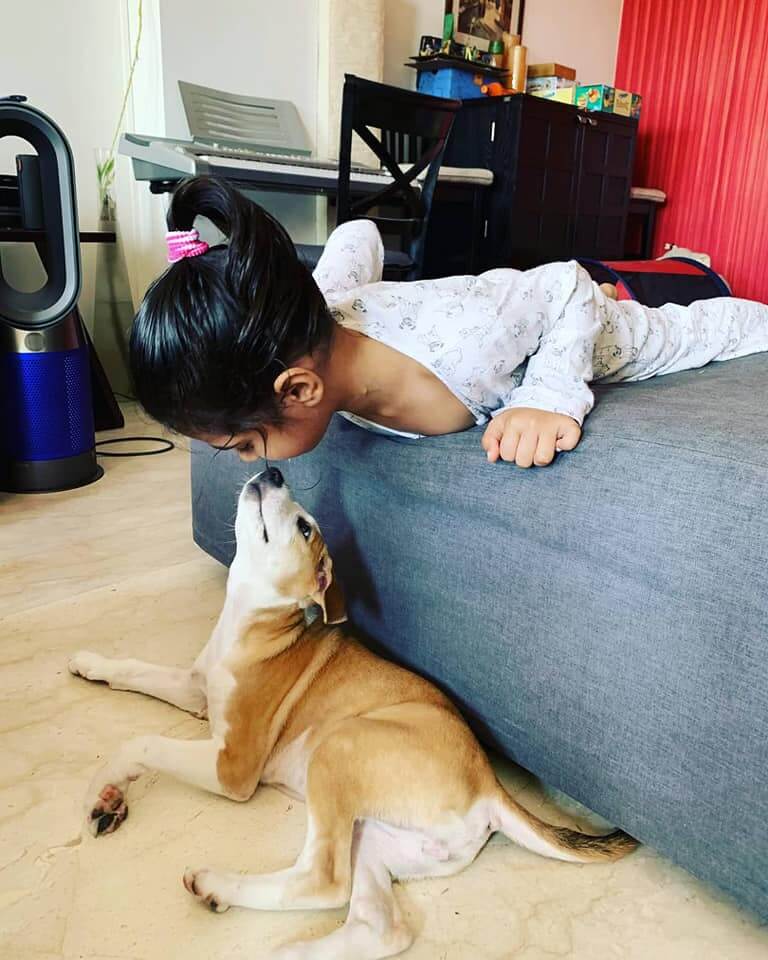Desi dogs have incredible Immunity
The immunity level of indie dogs is far better than foreign breeds, they’ve perhaps the best gene pool for Indian conditions. Having evolved through the generations to suit themselves to sub-continent conditions, Indian pariah dogs are least susceptible to the diseases that the pedigree often fall prey to.
Indian street dogs (Indian pariah dogs) are extremely alert & social.
Highly intelligent, and amicable, they’re one of the most versatile and adaptable dog breeds found in India. Desi dogs are loyal, loving, and street-smart.
Indian Pariah dogs make for loving family pets and are great with kids and adults. They are high on energy and complement kids with an active lifestyle.

Ancient Dogs but Excellent Pets
Most Pariahs Dogs are semi-nomadic: they wander around and they do their own thing. They are found all around India and Bangladesh, and maybe even further afield. Even though they are historically used to having a degree of independence, they can be domesticated, socialized, and trained quite easily.
Pariah dogs are very social animals, often having large packs and a hierarchical system within their packs. They are quite used to being around humans, having lived in close proximity with us for thousands of years. However, the Indian Pariah dogs still have to deal with a lot of threats like tigers and bears in their very recent history. Because of this, they are still very cautious dogs.
Some people might mistake this caution for cowardice, but they would be wrong. Caution has clearly kept the breed alive for hundreds of years. When small sized dogs like the Indian Pariahs encounter a big threat, they band together with their pack to see it off. If the pack is not around, they will run away. Caution has served them well.
This cautious nature makes them shy with humans aren’t familiar with. However, with a little encouragement and trust, they can make fast friends. Naturally defensive, if you are on their side, they will literally fight to the death for you. That was how packs worked: sacrifice yourself for the survival of the group.

Indian Pariah Dogs are found all around the Indian subcontinent and there is considerable variation in their appearance. They are generally tan, rust, or fawn in color with a white underside and markings. But they can be black, dark brown, and just about anything in between.
A breed standard has been officially recognized but that doesn’t mean these animals don’t have a lot of variety to them.
Most Pariah dogs have a tail that curls back on their body. The tail can also vary, as some are straighter and some longer. Their tails are usually quite fluffy and the fur on their body is short and sometimes glossy.
A stocky and short breed, they are tough and muscular when exercised. Their heads are wedge shaped with a pointed muzzle. With dark brown eyes that can sometimes go to gold, they have a distinctive look with their almond-shaped eyes.
With pricked ears that are usually facing forward, they have something of a fox look to them. A Pariah dog can grow up to 25 inches tall and weigh up to 66 pounds, so they are considered to be dense creatures.
They can live in good health for a long time with a lifespan of up to 15 years. With modern medicine and diets, they will probably live longer. These dogs managed to survive in the wild without puppy vaccinations and medical treatment. Imagine how well they’ll fare with regular check ups at the local animal hospital.
Their cautious nature can make them seem a little aloof and shy. However, when they realize you aren’t a threat (it doesn’t take long), they can warm up to you quickly. Playful and very intelligent, they make great playmates for children. As guard dogs, they take good care of your kids and property.
Training a Pariah Dog is very easy: they are smart enough to pick up on cues and commands, and love to please their masters. With early socialization and training, they can make fantastic pets.
They are alert and aware nearly every second they are awake, which can be tiresome to people who are more used to mellow dogs. Pariahs have a lot of energy to expend, so they need quite a lot of attention.
Their guard dog nature has made them cautious of strangers and aggressive towards people and animals that threaten them. However, they are not needlessly aggressive and would rather avoid a fight than take part in one. When pressed or threatened, they will stand their ground effectively and are capable of taking down animals and humans much bigger than they are.